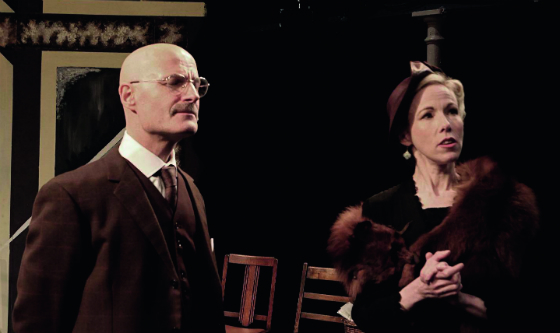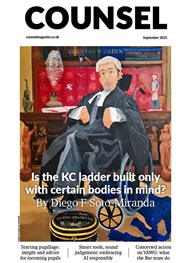*/
 Nigel Pascoe QC reviews the recent staging of Judgement at Nuremberg at the Bridewell Theatre to which lawyer-actors brought their forensic skills
Nigel Pascoe QC reviews the recent staging of Judgement at Nuremberg at the Bridewell Theatre to which lawyer-actors brought their forensic skills
Judging the Judges is a diverting philosophical exercise. The Bar are at it every day. But in the third Nuremberg trial it happened with a vengeance when four Nazi Judges faced an American panel of three. Was it to be victor’s justice and the least they deserved? Or were there real defences in law which could be deployed?
In recent years, Judgement at Nuremberg has been staged at the Tricycle Theatre as well as other lawyer’s productions, including 12 Angry Men, Inherit The Wind and To Kill a Mockingbird ; all directed very successfully by Sally Knyvette. Any lawyer-actors would love the chance to bring their forensic skills to a professional venue and professionally directed, they can bring authentic attack and real flair to these classic court-room dramas: so again with this new staging at the Bridewell Theatre. The great virtue of this compelling play is that without ever losing its moral core, it is pretty even-handed in examining the issues and particularly who knew what of the Holocaust in legal and civilian circles. It reaches the right conclusion, but in the process, also allows us to follow the fall of a great but flawed German judge. Unlike his co-defendants whom he despises, this Judge has the moral courage to condemn himself. In dramatic terms then, a stonking great speech for a lawyer-actor and a marvellous central part - the fair and modest small-town American Judge.
We were not disappointed.This was a tremendous production, brilliantly directed by Sally Knyvette, taut, clearly spoken and generating real tension and engagement in the issues. The lawyers were living out their dreams along with some professionals, all to support the Paul’s Cancer Support Centre. But this was no amateur production. Pin-sharp casting produced some fantastic performances and a very high level of ensemble playing. As Judge Haywood, Stephen Boyd was totally convincing, a calm and beautifully controlled performance. Crispian Cartwright as Ernst Janning gave the performance of a lifetime: a truly brilliant piece of stagecraft, delivered with immense and chilling control. Peter Hill energetically represented Janning with admirable command and presence. Peter Dodge was a powerful prosecutor, giving no ground.
In the smaller roles, the standards remained impressively high. Iain Christie narrated with total assurance and control as well as being a clearly drawn tight-lipped Nazi defendant. Rachel Lawrence caught splendidly the ambiguity of the German widow. Although her soldier husband had already been hanged, she retained an affection for America and perhaps for Judge Haywood. Peter Cowell was quite superb as a German witness and Caroline Eady skilfully caught the fear of Maria Wallner. Rob McCreath doubled very persuasively, whilst Caroline Havers was a charming and confident local German. Jonathan Taylor an impressive and confident escort. No weaknesses at all in the supporting players. The music, haunting and evocative; high praise to Tim Phillips. Finally a thrilling and disturbing choreography of Khristallnacht by Thea Stanton. Definitely a huge success. Equity applications in the post.
Nigel Pascoe QC, Pump Court Chambers
We were not disappointed.This was a tremendous production, brilliantly directed by Sally Knyvette, taut, clearly spoken and generating real tension and engagement in the issues. The lawyers were living out their dreams along with some professionals, all to support the Paul’s Cancer Support Centre. But this was no amateur production. Pin-sharp casting produced some fantastic performances and a very high level of ensemble playing. As Judge Haywood, Stephen Boyd was totally convincing, a calm and beautifully controlled performance. Crispian Cartwright as Ernst Janning gave the performance of a lifetime: a truly brilliant piece of stagecraft, delivered with immense and chilling control. Peter Hill energetically represented Janning with admirable command and presence. Peter Dodge was a powerful prosecutor, giving no ground.
In the smaller roles, the standards remained impressively high. Iain Christie narrated with total assurance and control as well as being a clearly drawn tight-lipped Nazi defendant. Rachel Lawrence caught splendidly the ambiguity of the German widow. Although her soldier husband had already been hanged, she retained an affection for America and perhaps for Judge Haywood. Peter Cowell was quite superb as a German witness and Caroline Eady skilfully caught the fear of Maria Wallner. Rob McCreath doubled very persuasively, whilst Caroline Havers was a charming and confident local German. Jonathan Taylor an impressive and confident escort. No weaknesses at all in the supporting players. The music, haunting and evocative; high praise to Tim Phillips. Finally a thrilling and disturbing choreography of Khristallnacht by Thea Stanton. Definitely a huge success. Equity applications in the post.
Nigel Pascoe QC, Pump Court Chambers
 Nigel Pascoe QC reviews the recent staging of Judgement at Nuremberg at the Bridewell Theatre to which lawyer-actors brought their forensic skills
Nigel Pascoe QC reviews the recent staging of Judgement at Nuremberg at the Bridewell Theatre to which lawyer-actors brought their forensic skills
Judging the Judges is a diverting philosophical exercise. The Bar are at it every day. But in the third Nuremberg trial it happened with a vengeance when four Nazi Judges faced an American panel of three. Was it to be victor’s justice and the least they deserved? Or were there real defences in law which could be deployed?
In recent years, Judgement at Nuremberg has been staged at the Tricycle Theatre as well as other lawyer’s productions, including 12 Angry Men, Inherit The Wind and To Kill a Mockingbird; all directed very successfully by Sally Knyvette. Any lawyer-actors would love the chance to bring their forensic skills to a professional venue and professionally directed, they can bring authentic attack and real flair to these classic court-room dramas: so again with this new staging at the Bridewell Theatre. The great virtue of this compelling play is that without ever losing its moral core, it is pretty even-handed in examining the issues and particularly who knew what of the Holocaust in legal and civilian circles. It reaches the right conclusion, but in the process, also allows us to follow the fall of a great but flawed German judge. Unlike his co-defendants whom he despises, this Judge has the moral courage to condemn himself. In dramatic terms then, a stonking great speech for a lawyer-actor and a marvellous central part - the fair and modest small-town American Judge.


Chair of the Bar sets out a busy calendar for the rest of the year
By Louise Crush of Westgate Wealth Management
Examined by Marie Law, Director of Toxicology at AlphaBiolabs
Time is precious for barristers. Every moment spent chasing paperwork, organising diaries, or managing admin is time taken away from what matters most: preparation, advocacy and your clients. That’s where Eden Assistants step in
AlphaBiolabs has announced its latest Giving Back donation to RAY Ceredigion, a grassroots West Wales charity that provides play, learning and community opportunities for families across Ceredigion County
Rachel Davenport, Co-founder and Director at AlphaBiolabs, outlines why barristers, solicitors, judges, social workers and local authorities across the UK trust AlphaBiolabs for court-admissible testing
Despite increased awareness, why are AI hallucinations continuing to infiltrate court cases at an alarming rate? Matthew Lee investigates
Come in with your eyes open, but don’t let fear cloud the prospect. A view from practice by John Dove
Looking to develop a specialist practice? Mariya Peykova discusses the benefits of secondments and her placement at the Information Commissioner’s Office
Anon Academic explains why he’s leaving the world of English literature for the Bar – after all, the two are not as far apart as they may first seem...
Review by Stephen Cragg KC